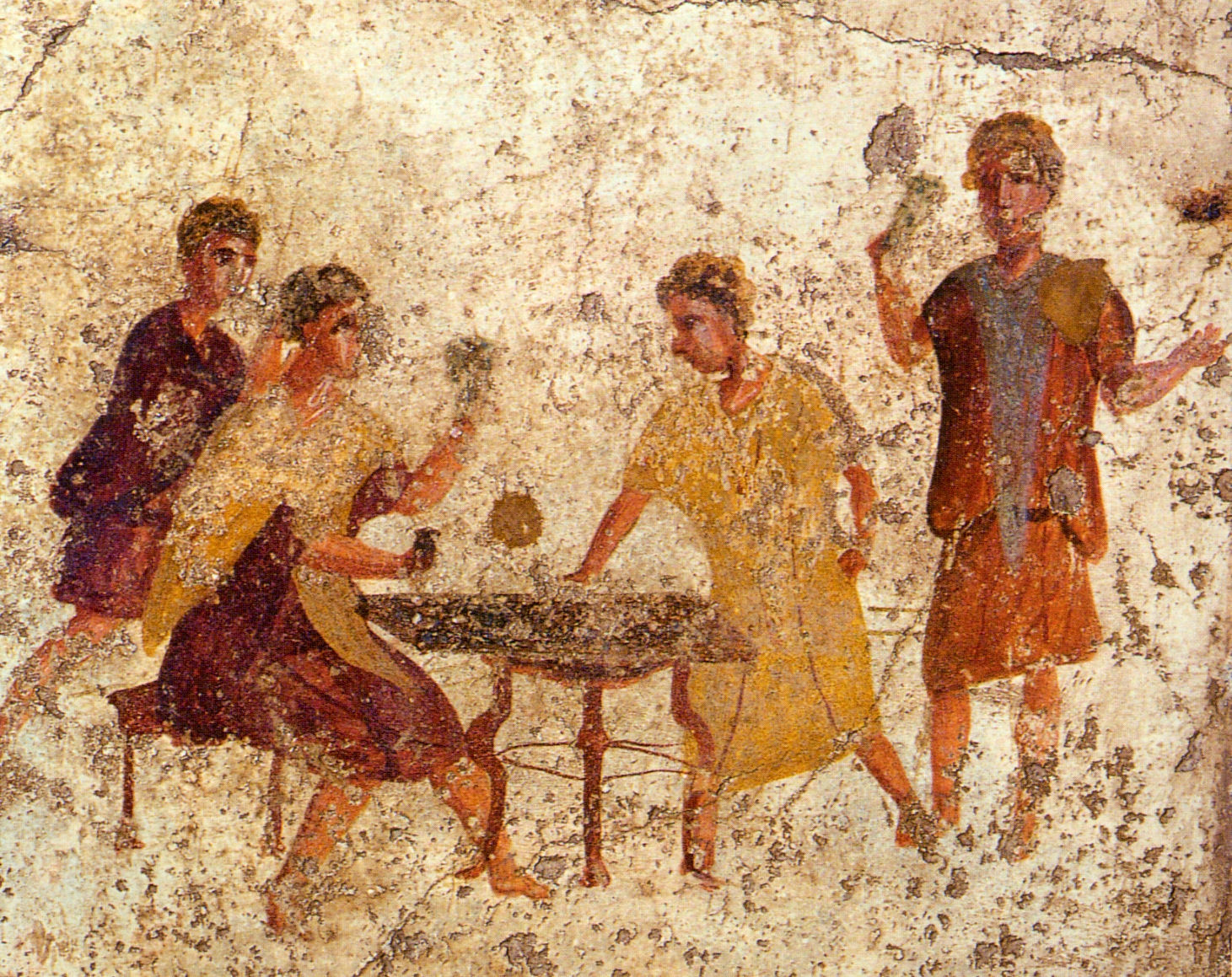 |
| Dice players. Roman fresco from the Osteria della Via di Mercurio (VI 10,1.19, room b) in Pompeii. Public Domain via Wikimedia |
 The Art of Happiness by Epicurus
The Art of Happiness by EpicurusMy rating: 5 of 5 stars
I found this book quite perplexing. I expected a hedonistic discussion of the life of reading, conversation, and communal living. Instead, I was learning about atomic theory and the atomic "swerve" (a way to explain randomness in the universe and the subsequent collision of atoms), the logic of the sun, moon,stars, and weather, and the need to be ever-vigilant to ignore the popular gods and to rely on empirical evidence rather than determinism (fate) and mythology to comprehend the otherwise unknown. The letters to Herodotus and Pythocles were all about such concepts, with only the letter to Menoeceus even touching upon the concept of happiness. I was surprised by the depth of the logos of Epicurean thought, and the loftiness of its ideals when compared with Stoic philosophy. Physics was originally known as natural philosophy, and Epicurus' understanding of the universe (based on the ideas of others and not just his own, of course), led to an anti-religious philosophy. Yet God is not absent in Epicurean thought. In the "Leading Doctrines" (pp. 174-5), Epicurus explains:
10. If the things that produce the debauchee's pleasures dissolved the mind's fears regarding the heavenly bodies, death, and pain and also told us how to limit our desires, we would never have any reason to find fault with such people, because they would be glutting themselves with every sort of pleasure and never suffer any physical or mental pain, which is the real evil.11. We would have no need for natural science unless we were worried by apprehensiveness regarding the heavenly bodies, by anxiety about the meaning of death, and also by our failure to understand the limitations of pain and desire.12. It is impossible to get rid of our anxieties about essentials if we do not understand the nature of the universe and are apprehensive about some of the theological accounts. Hence it is impossible to enjoy our pleasures unadulterated without natural science.
Moral acts involve deliberate "choices" of possible concrete pleasures and "aversions", i.e., the "deliberate avoidance of prospective pain. An act is moral if in the long run, all things considered, it produces in the agent a surplus of pleasure over pain; otherwise it is immoral". Our choices, desires, and aversions play a prominent role in Stoic philosophy, too. So too, are our impressions, and Epicurus outlines his theology thus:
The gods do indeed exist, since our knowledge of them is a matter of clear and distinct perception.
However, Epicurus warned against anthropomorphising the gods (or God), and that the gods did not control nature. Rather, their role was ethical, and the gods were abstract (p. 41):
psychological projections of what every good Epicurean wanted himself to be... Thus a relapse into "the old-time religion" of a god-controlled universe has very serious consequences: It cuts the worshipper off from the gods' images - that is, alienates him from the divine communion - and it plunges the naive believer once more into the ancient fears that Epicurus seeks to allay: namely, that the gods will avenge themselves on wicked men by causing natural disasters, political upheavals, and finally the torments of death and hell.
For the Roman poet, Lucretius:
True religion is rather the power to contemplate nature with a mind set at peace.
Nevertheless, Epicurus was keen to attack other philosophies and religions, so it is not surprising that he got some of his own back! When I was schooled in snippets of Greek philosophy, Socrates, Plato, and Aristotle were the godhead "gang of three" (see De Bono), and the Presocratics and others were treated as the great pretenders. Yet Epicurus, too, was asking those two great questions: How to live and what to believe (see Murray in my previous article), and his atomic theory addressed the second question in order to address the first. God exists, but, like the atomic swerve, free will exists otherwise there would be no need for ethics, for our behaviour would be pre-determined. According to Strodach's Introduction, the Epicurean materialism (which was morphed or "garbled" into "eat, drink, and be merry") was "so unpalatable" to the ancient and medieval worlds that Epicurus' atomic theory was lost until the 17th Century (uncovered by "the Jesuit priest Pierre Gassendi, a contemporary of Descartes", see p. 76). And so I find myself in agreement with Daniel Klein (see Foreword):
For a moment, the twenty-first-century mind might recoil at the idea of a self-anointed pundit proclaiming to his students - and to us - exactly how to live. But I, for one, read on for the simple reason that I suspect Epicurus may, in fact, have gotten it right.
 Donate
Donate




